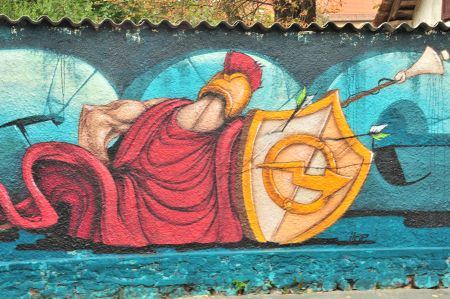Ljubljana - street art and cultural community Metelkova
- Written by Portal Editor
The next day was also marked by a further tour into the city of Ljubljana, especially the Street Art with the graffiti on many house and façades, probably due to the many young inhabitants, had aroused our keen interest.
The university, which exists since 1919, has probably not been without influence on the development of the city, so the student's youthfulness influence can hardly be concealed. Even after the first few meters of walking, we were surprised by the large number of graffiti and even more about the number of bicycles.
Bicycle bans on major, busy roads
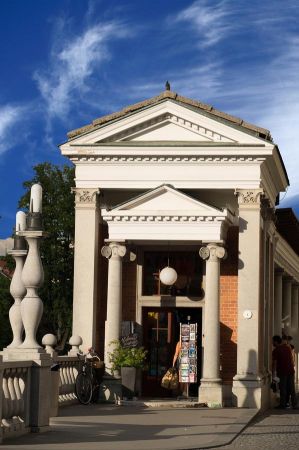 After first talks, we learned that bicycle traffic was that much significant, especially in the summer, that it had to be heavily regulated by traffic planning already. There were even bicycles prohibited on some important traffic-rich streets. On some sections, the prohibition was repealed in the meantime, mostly in connection with the construction of additional cycle paths, including the southern part of the Slovenska cesta in 2016, a main traffic lane in Ljubljana.
After first talks, we learned that bicycle traffic was that much significant, especially in the summer, that it had to be heavily regulated by traffic planning already. There were even bicycles prohibited on some important traffic-rich streets. On some sections, the prohibition was repealed in the meantime, mostly in connection with the construction of additional cycle paths, including the southern part of the Slovenska cesta in 2016, a main traffic lane in Ljubljana.
The bike rental system BicikeLJ had already been introduced in 2012. Who is registered in the city map Urbana can use one of the offered bikes in the system for up to max. 60 min absolutely free of charge. Since 2013, numerous roads, where bicycles have previously been banned, have now been blocked for individual car travel and are only accessible by bus or bicycles or can be used on foot. In 2015, Ljubljana was named as a bicycle-friendly city for the first time by the transport planning Copenhagenize Design Company. This information is important for bicycle enthusiasts, who always have their vehicles on the campers and want to achieve their goals by cycling as much as possible.
The market around the cathedral is worth seeing
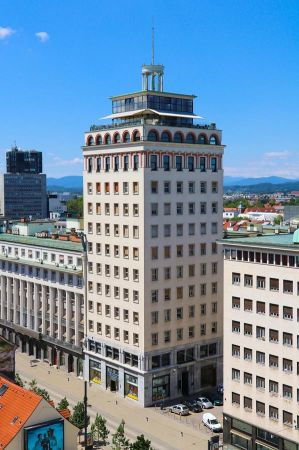 South of the Šentjakobski most (St. Jacob bridge between the streets Zoisova cesta and Karlovška cesta) on the western river side the Ljubljanica terraces lies a popular meeting point at the weekend. The market around the cathedral is particularly interesting, especially on Saturdays full of life. Also worthy to note are the fish market stalls hidden under the colonnades and a special area in the building opposite the colonnades. On Saturdays there is an art-market between the three bridges and Čevljarski most (the Schuster Bridge). Ljubljana also has an impressive railway museum with an extensive collection of historical steam locomotives, an interesting destination on a rainy day.
South of the Šentjakobski most (St. Jacob bridge between the streets Zoisova cesta and Karlovška cesta) on the western river side the Ljubljanica terraces lies a popular meeting point at the weekend. The market around the cathedral is particularly interesting, especially on Saturdays full of life. Also worthy to note are the fish market stalls hidden under the colonnades and a special area in the building opposite the colonnades. On Saturdays there is an art-market between the three bridges and Čevljarski most (the Schuster Bridge). Ljubljana also has an impressive railway museum with an extensive collection of historical steam locomotives, an interesting destination on a rainy day.
Metelkova is an internationally-renowned alternative culture community in the centre of Slovenia's capital, that often draws comparisons to Copenhagen's Kristiania. A self-declared 'Autonomous Culture Zone,' Metelkova Mesto occupies the former 'Fourth of July' military barracks originally commissioned by the Austro-Hungarian army back in 1882 and completed in 1911. The space consists of seven buildings and 12,500m2 - making it a sort of city within a city - comprising a former prison (now Celica Hostel), several clubs, live music spaces, art galleries and artist studios. Dedicated to organising social and cultural activities for the public, Metelkova has a nonstop events schedule and is arguably the best after-dark destination in Ljubljana for those looking to experience something wholly unique and unpredictable.
Numerous artists have their studios in Metelkova
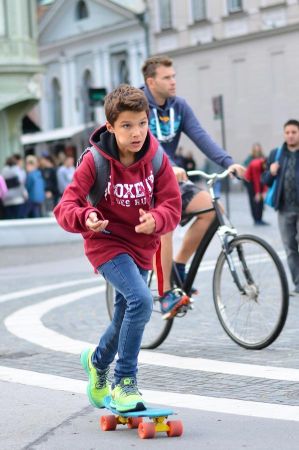 Since it was first created in 1993, Metelkova has consistently been the object of political jockeying, with the long-term status and survival of the community uncertain. Constantly threatened by the lure of commercial development, neo-conservative politicians and internal problems within the 'autonomous zone,' Metelkova has endured simply through the creativity, imagination, energy and determination of the many individuals who have fought to maintain the autonomy and diversity of community, often through physical, yet non-violent, resistance. The community's greatest defense has been the tireless virtue of the events, festivals, and clubs it organises. For years Metelkova hosted the only Women's Centre in Slovenia and is still today the only place in the country with community-run clubs for disabled people, gays and lesbians. Numerous campaigns against racism, domestic and institutional abuse have been organised and operated out of Metelkova. Ljubljana's only gay (Klub Tiffany) and lesbian (Klub Monokel) clubs are in Metelkova, which is also one of the few places in Slovenia to offer ethnic, sexual and other minorities the chance to socialise openly in a community. Many artists have their studios in Metelkova and the space's clubs play host to all range of music from hardcore to jazz to dub to techno. Celica Hostel is one of the most unique and consistently well-ranked hostels in Europe, and Metelkova's Alkatraz Gallery has one of the most diverse and creative contemporary art collections in former Yugoslavia.
Since it was first created in 1993, Metelkova has consistently been the object of political jockeying, with the long-term status and survival of the community uncertain. Constantly threatened by the lure of commercial development, neo-conservative politicians and internal problems within the 'autonomous zone,' Metelkova has endured simply through the creativity, imagination, energy and determination of the many individuals who have fought to maintain the autonomy and diversity of community, often through physical, yet non-violent, resistance. The community's greatest defense has been the tireless virtue of the events, festivals, and clubs it organises. For years Metelkova hosted the only Women's Centre in Slovenia and is still today the only place in the country with community-run clubs for disabled people, gays and lesbians. Numerous campaigns against racism, domestic and institutional abuse have been organised and operated out of Metelkova. Ljubljana's only gay (Klub Tiffany) and lesbian (Klub Monokel) clubs are in Metelkova, which is also one of the few places in Slovenia to offer ethnic, sexual and other minorities the chance to socialise openly in a community. Many artists have their studios in Metelkova and the space's clubs play host to all range of music from hardcore to jazz to dub to techno. Celica Hostel is one of the most unique and consistently well-ranked hostels in Europe, and Metelkova's Alkatraz Gallery has one of the most diverse and creative contemporary art collections in former Yugoslavia.
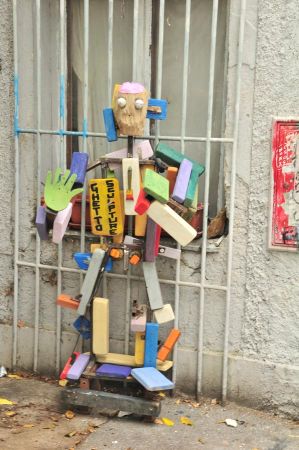 For the casual visitor to Ljubljana, Metelkova is a great place to meet people and immediately get your finger on the underground pulse of Ljubljana. Remarkable simply for its existence, Metelkova is a refreshing break from the overwhelmingly homogeneous, clean and prim European atmosphere of Slovenia's capital; perhaps the only space that feels truly 'urban' in the city. During the day, Metelkova may seem a bit sleepy and surreal, but nonetheless has plenty of creativity on display visually. At night it becomes the most reliable place to find a party, with the-devil-knows-what happening in its over seven clubs and all over its common spaces. The best way to find out is to turn up. The 'Autonomous Culture Zone' welcomes guests and is at night a cheap place to have a good time under uncertain circumstances. Don't miss it, and importantly - don't fail to support this communal, creative space, if only with the strength of your energy and presence.
For the casual visitor to Ljubljana, Metelkova is a great place to meet people and immediately get your finger on the underground pulse of Ljubljana. Remarkable simply for its existence, Metelkova is a refreshing break from the overwhelmingly homogeneous, clean and prim European atmosphere of Slovenia's capital; perhaps the only space that feels truly 'urban' in the city. During the day, Metelkova may seem a bit sleepy and surreal, but nonetheless has plenty of creativity on display visually. At night it becomes the most reliable place to find a party, with the-devil-knows-what happening in its over seven clubs and all over its common spaces. The best way to find out is to turn up. The 'Autonomous Culture Zone' welcomes guests and is at night a cheap place to have a good time under uncertain circumstances. Don't miss it, and importantly - don't fail to support this communal, creative space, if only with the strength of your energy and presence.
Ljubljana - Street art and culture in Metelkova
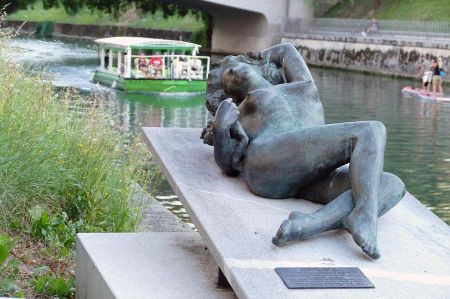 The Slovenian capital Ljubljana is known for its picturesque old town, the charming Ljubljanica river promenade and its impressive architecture. But away from the classic sights, there is a place that is known far beyond the country's borders for its rebellious creativity and alternative culture: Metelkova Mesto.
The Slovenian capital Ljubljana is known for its picturesque old town, the charming Ljubljanica river promenade and its impressive architecture. But away from the classic sights, there is a place that is known far beyond the country's borders for its rebellious creativity and alternative culture: Metelkova Mesto.
Metelkova is the heart of Ljubljana's alternative scene and a true paradise for street art lovers, artists and night owls. In this blog we take you on a journey through the fascinating world of street art, subculture and creative spaces in Metelkova.
Metelkova - A brief historical overview
Metelkova has an exciting history that goes far beyond what you see at first glance.
From military base to artist commune
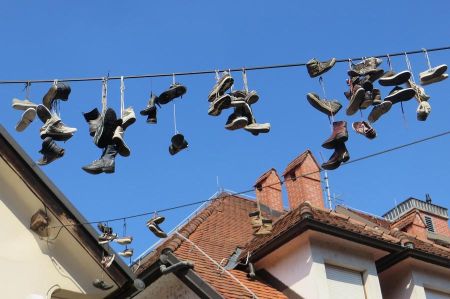 Metelkova was once a military barracks of the Yugoslav army. After the breakup of Yugoslavia in 1991, the area was taken over by the Slovenian government. But instead of using it for commercial or government purposes, in 1993 a group of artists, activists and free spirits occupied the site and turned it into a creative space.
Metelkova was once a military barracks of the Yugoslav army. After the breakup of Yugoslavia in 1991, the area was taken over by the Slovenian government. But instead of using it for commercial or government purposes, in 1993 a group of artists, activists and free spirits occupied the site and turned it into a creative space.
Since then, Metelkova has been an autonomous cultural centre that is self-governing and operates independently of the city government. Today it is a symbol of artistic resistance, creative freedom and alternative culture in Slovenia.
Street Art in Metelkova - An Open-Air Museum of Creativity
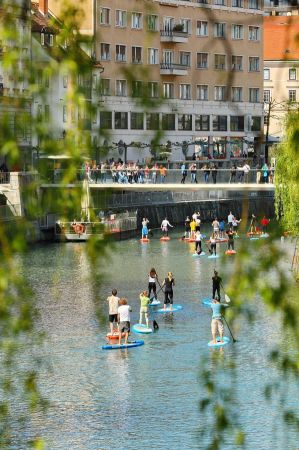 Metelkova is a living canvas. Almost every wall, door or wall is covered with colourful graffiti, murals, sculptures and installations. There are no uniform styles or commercial art here - every corner tells a different story.
Metelkova is a living canvas. Almost every wall, door or wall is covered with colourful graffiti, murals, sculptures and installations. There are no uniform styles or commercial art here - every corner tells a different story.
1. Graffiti & Murals - Art against the Establishment
The walls of Metelkova are painted with political messages, surrealist depictions and socially critical statements. Many artists deal with issues such as human rights, the environment, feminism or anarchism.
Famous motifs that you can discover in Metelkova:
Abstract faces and surreal figures - Many graffiti show expressive portraits or surreal creatures that make you think.
Social protest art - Street art with political slogans protesting against capitalism, surveillance or racism.
Mythological and folkloric symbols - Symbols from Slovenian and Balkan mythology are often found in Metelkova.
2. Sculptures and installations - Art made from scrap and metal
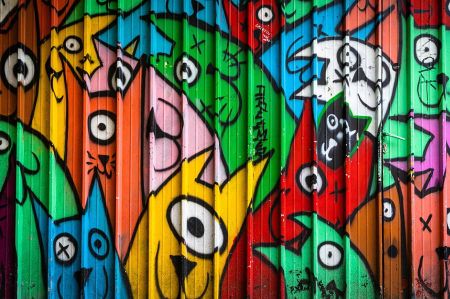 In addition to murals, there are also numerous creative sculptures and installations. Many are made from recycled material such as metal, wood and glass, which gives Metelkova a unique post-apocalyptic charm.
In addition to murals, there are also numerous creative sculptures and installations. Many are made from recycled material such as metal, wood and glass, which gives Metelkova a unique post-apocalyptic charm.
Metal sculptures with moving parts - Some sculptures almost seem alive when the wind moves them.
Surreal constructions made from old bicycles and machines - A symbol of creativity and recycling.
Colourful mosaics and mirror installations – they reflect the light and create fascinating effects.
Metelkova by night – clubs, bars and underground parties
Metelkova is not only an arts hub, but also the epicenter of alternative nightlife in Ljubljana. There are no fancy lounges or commercial clubs here – instead, you'll find DIY clubs, punk bars and underground electronic parties.
1. Clubs with a unique character
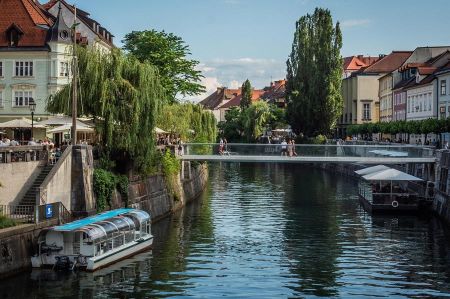 Each club in Metelkova has its own theme and music genre:
Each club in Metelkova has its own theme and music genre:
Gromka – A legendary club for punk, rock and metal. Perfect for those who like it loud and raw.
Club Tiffany & Monokel – These two clubs are LGBTQ+ friendly and known for their queer parties and techno nights.
Menza pri Koritu – An alternative venue with live concerts, jam sessions and experimental music.
Channel Zero – The heart of the electronic music scene in Metelkova, with techno, drum’n’bass and house parties.
2. A meeting place for free spirits
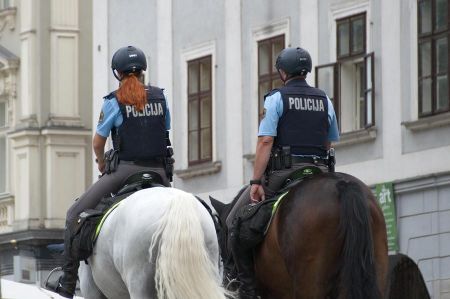 Metelkova attracts people from all over the world:
Metelkova attracts people from all over the world:
- Young locals who love alternative music.
- Travelers and backpackers who want to experience authentic Ljubljana.
- Artists, musicians and creatives who want to get inspired.
Whether you just want to drink a beer or dance the night away to electronic beats, Metelkova offers a unique experience that you won't find in any other city.
Cultural events and festivals in Metelkova
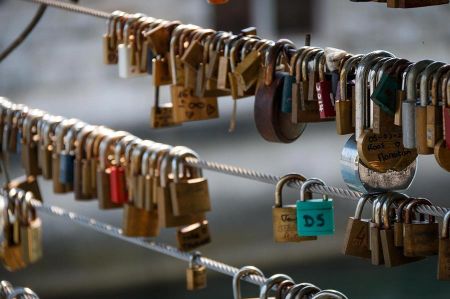 Besides street art and nightlife, Metelkova also offers a variety of cultural events, workshops and festivals.
Besides street art and nightlife, Metelkova also offers a variety of cultural events, workshops and festivals.
Theatre performances and performances – Experimental art projects and street theatre.
Independent film screenings – Alternative and political films in small cinema halls.
Music festivals – From punk to jazz to Balkan beats, there is something for every taste.
Political discussions and workshops – Activism, social issues and DIY art projects.
Metelkova – A place of free art, but also of controversy
Metelkova is an oasis of creative freedom, but not everyone in Ljubljana sees the place in a positive light. As it is an autonomous zone, there are always tensions with the city administration. Some politicians and investors want to use the site commercially, while others want to protect Metelkova as an important cultural heritage site.
Gentrification or subculture preservation?
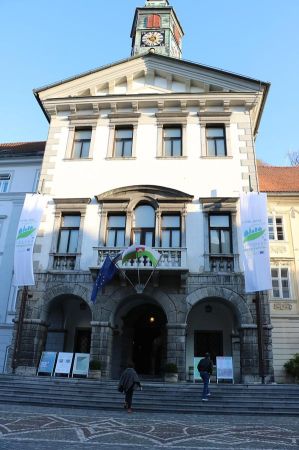 While Metelkova remains a creative hub, there are discussions about whether it will open up to commercial tourism or preserve its alternative identity. The future will tell if this unique place can retain its rebellious character.
While Metelkova remains a creative hub, there are discussions about whether it will open up to commercial tourism or preserve its alternative identity. The future will tell if this unique place can retain its rebellious character.
Tips for your visit to Metelkova
✔ Best time of day: During the day, Metelkova is a street art paradise for photographers and art lovers.
✔ Best time of night: At night, Metelkova comes alive with music, concerts and parties.
✔ Safety: Despite its rough charm, Metelkova is safe for visitors - but as everywhere, keep an eye on your valuables.
✔ Getting there: Can be reached on foot from the old town in about 10 minutes.
Conclusion - Metelkova as the creative heart of Ljubljana
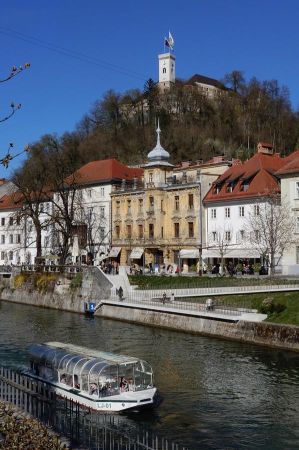 Metelkova is much more than just a street art district - it is a symbol of freedom, artistic expression and cultural diversity. It combines political messages with creative art and creates a space where people come together regardless of origin, gender or status.
Metelkova is much more than just a street art district - it is a symbol of freedom, artistic expression and cultural diversity. It combines political messages with creative art and creates a space where people come together regardless of origin, gender or status.
Whether you love art, are looking for alternative music or just want to discover the other side of Ljubljana - Metelkova is a must for every visitor.
Have you ever been to Metelkova? Share your impressions in the comments!
Please read as well:
Ljubljana - first impressions and historical background
Shkodra castle hill and modernity in the city centre
-
 Ljubljana - special sites during city excursion
Ljubljana - special sites during city excursion
Ljubljana - special sites during city excursion
Ljubljana - special sites during city excursion
-
 Ljubljana - special sites during city excursion
Ljubljana - special sites during city excursion
Ljubljana - special sites during city excursion
Ljubljana - special sites during city excursion
-
 Ljubljana - special sites during city excursion
Ljubljana - special sites during city excursion
Ljubljana - special sites during city excursion
Ljubljana - special sites during city excursion
-
 Ljubljana - special sites during city excursion
Ljubljana - special sites during city excursion
Ljubljana - special sites during city excursion
Ljubljana - special sites during city excursion
-
 Ljubljana - special sites during city excursion
Ljubljana - special sites during city excursion
Ljubljana - special sites during city excursion
Ljubljana - special sites during city excursion
-
 Ljubljana - special sites during city excursion
Ljubljana - special sites during city excursion
Ljubljana - special sites during city excursion
Ljubljana - special sites during city excursion
-
 Ljubljana - special sites during city excursion
Ljubljana - special sites during city excursion
Ljubljana - special sites during city excursion
Ljubljana - special sites during city excursion
-
 Ljubljana - special sites during city excursion
Ljubljana - special sites during city excursion
Ljubljana - special sites during city excursion
Ljubljana - special sites during city excursion
-
 Ljubljana - special sites during city excursion
Ljubljana - special sites during city excursion
Ljubljana - special sites during city excursion
Ljubljana - special sites during city excursion
-
 Ljubljana - special sites during city excursion
Ljubljana - special sites during city excursion
Ljubljana - special sites during city excursion
Ljubljana - special sites during city excursion
-
 Ljubljana - special sites during city excursion
Ljubljana - special sites during city excursion
Ljubljana - special sites during city excursion
Ljubljana - special sites during city excursion
-
 Ljubljana - special sites during city excursion
Ljubljana - special sites during city excursion
Ljubljana - special sites during city excursion
Ljubljana - special sites during city excursion
-
 Ljubljana - special sites during city excursion
Ljubljana - special sites during city excursion
Ljubljana - special sites during city excursion
Ljubljana - special sites during city excursion
-
 Ljubljana - special sites during city excursion
Ljubljana - special sites during city excursion
Ljubljana - special sites during city excursion
Ljubljana - special sites during city excursion
-
 Ljubljana - special sites during city excursion
Ljubljana - special sites during city excursion
Ljubljana - special sites during city excursion
Ljubljana - special sites during city excursion
-
 Ljubljana - special sites during city excursion
Ljubljana - special sites during city excursion
Ljubljana - special sites during city excursion
Ljubljana - special sites during city excursion
-
 Ljubljana - special sites during city excursion
Ljubljana - special sites during city excursion
Ljubljana - special sites during city excursion
Ljubljana - special sites during city excursion
-
 Ljubljana - special sites during city excursion
Ljubljana - special sites during city excursion
Ljubljana - special sites during city excursion
Ljubljana - special sites during city excursion
-
 Ljubljana - special sites during city excursion
Ljubljana - special sites during city excursion
Ljubljana - special sites during city excursion
Ljubljana - special sites during city excursion
-
 Ljubljana - special sites during city excursion
Ljubljana - special sites during city excursion
Ljubljana - special sites during city excursion
Ljubljana - special sites during city excursion
-
 Ljubljana - special sites during city excursion
Ljubljana - special sites during city excursion
Ljubljana - special sites during city excursion
Ljubljana - special sites during city excursion
-
 Ljubljana - special sites during city excursion
Ljubljana - special sites during city excursion
Ljubljana - special sites during city excursion
Ljubljana - special sites during city excursion
-
 Ljubljana - special sites during city excursion
Ljubljana - special sites during city excursion
Ljubljana - special sites during city excursion
Ljubljana - special sites during city excursion
-
 Ljubljana - special sites during city excursion
Ljubljana - special sites during city excursion
Ljubljana - special sites during city excursion
Ljubljana - special sites during city excursion
https://www.alaturka.info/en/slovenia/3519-ljubljana-street-art-and-cultural-community-in-metelkova#sigProId9625bdd645
